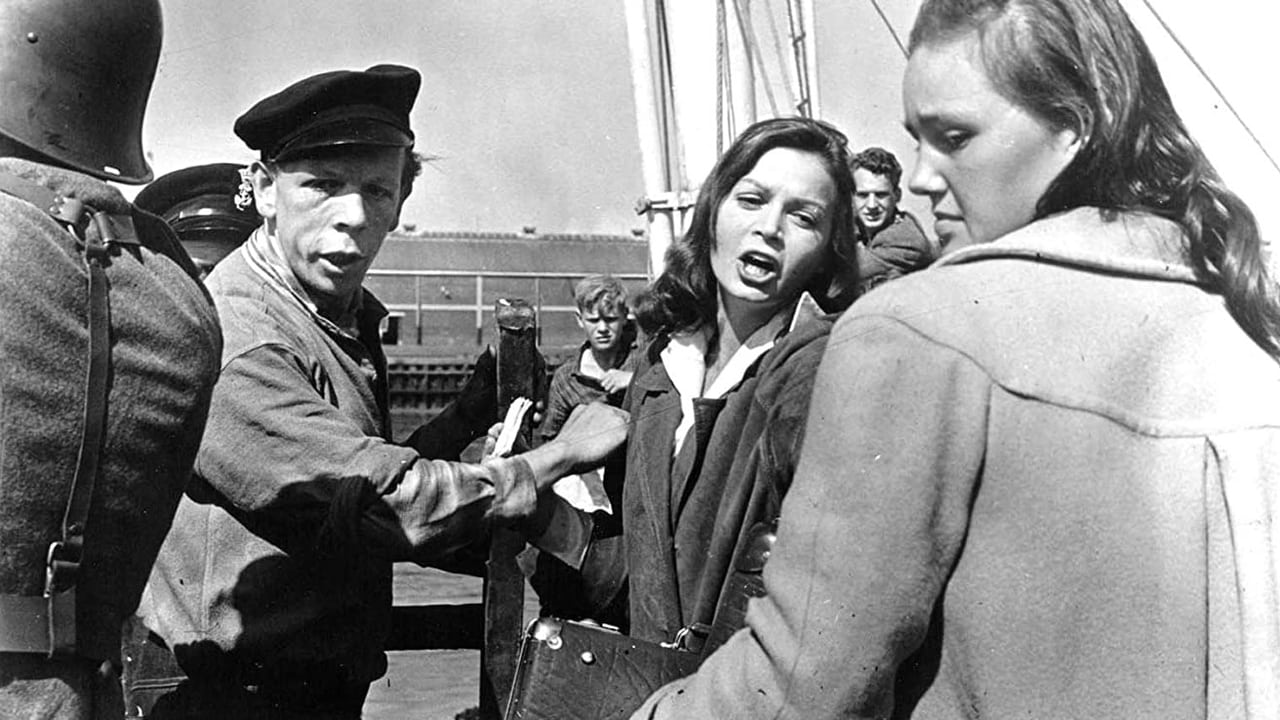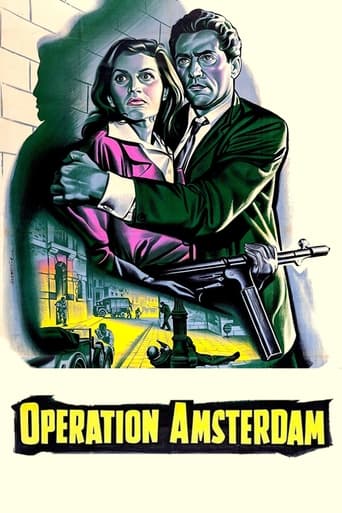Kattiera Nana
I think this is a new genre that they're all sort of working their way through it and haven't got all the kinks worked out yet but it's a genre that works for me.
ReaderKenka
Let's be realistic.
BroadcastChic
Excellent, a Must See
TaryBiggBall
It was OK. I don't see why everyone loves it so much. It wasn't very smart or deep or well-directed.
JohnHowardReid
Operation Amsterdam (1959) sounds promising, but the film has a number of irritating defects. True, some of the atmosphere in the imperiled city is conveyed thanks to location lensing in Amsterdam which involved a considerable amount of organizing like removing traffic from the streets, replacing it with contemporary vehicles and making sure all the extras wore the correct wartime clothing. Unfortunately, all this admirable location lensing is somewhat undercut by the continuous and obvious use of studio cut-ins against a process screen. On the other hand, the editing of the action spots is nice and sharp, particularly the sequence in which the car goes over the wharf. This is most effective indeed! I was also thrilled by the sequence in which we wait for the time lock to come off which features shorter and shorter cross- cutting. Elsewhere, however, the editing tends to be rather slack, dragged out and as placidly routine as Michael McCarthy's direction.. There's also far too much padding in the script. At least 30 minutes should have been jettisoned, including all Malcolm Keen's scenes. True, he's a competent actor, but here his delivery is uncomfortably slow. And worse, what he has to say is of little importance and just time- consuming. Alexander Knox is also saddled with some of the script's most pious platitudes. The other players make an effort to overcome their banal dialogue, though Peter Finch also struggles to make an impression. And as for the miscasting of one of my favorite comedians, John LeMesurier, as a colonel in the Dutch War Ministry, the less said the better! Fortunately, the film does gain attention with a brilliant use of musical sound effects. In fact the music score throughout is a major asset.
oldblackandwhite
I wanted to like Operation Amsterdam, but for some reason I could never get absorbed into it the way you have to to enjoy a movie. It had a good cast, led by the excellent Peter Finch and the beautiful Eva Bartok. Alexander Knox was there, too. His presence is usually an asset, but in this one he was given little to do. I was hoping to see him as a Dutch fifth columnist baddie, since nasty was what he did best, but he played a bland little fellow with few lines. His character was in practically every scene but seemed to have no real function.The World War II intrigue story showed much promise. Dutch diamond merchants (Finch and Knox) with a British special forces officer (Tony Britton) sneak into the Netherlands at the time Amsterdam is about to fall to invading German forces. Their purpose is to smuggle all of the diamonds they can back to England in order to keep these invaluable industrial items out of German hands. The two main hurdles to overcome will be convincing all of the Dutch diamond dealers to hand over their goods and to keep from being shot by one of the groups of "fifth columnists", Nazi sympathizers in regular Dutch army uniforms, who are roaming the streets. With loyal soldiers around, too, it is hard to tell friend from foe. The diamond commandos are aided by the beautiful Bartok driving her beautiful Mercedes automobile like a bat out of you-know-where and an underground resistance group, strangely well-organized and well-armed considering that the Nazis have not yet taken over their government.The cinematography was good, though not outstanding. Being a sucker for the black & white widescreen movie, a format which was not popular for a very long period, is one of the reasons I bought the DVD of Operation Amsterdam. The wide screen is used very well, especially in panoramic shots of civilians fleeing down a dike road and in the street fighting scenes. There is lots of action with all of it well staged and some effective suspense.So why did I not like this movie better. Flabby direction by Michael McCarthy and sloppy editing were two problems. Tony Britton was simply not up to the pivotal role of the tough British secret service officer. He just was not dynamic enough. It is a shame we couldn't have had Trevor Howard or Richard Harris, both of whom excelled at this type of role. Worst for me, was the jazzy score by Philip Green. Rather than enhancing the action and the suspense, it was irritating and inappropriate for the historical period.Well, maybe it was just me. My grouchy old wife, who is usually more picky about movies than I am, liked it better than I did, and so did most others who have reviewed it and posted on the message board. It was sincere and historically authentic, typically good points of British movies from this era. It was over all pretty good, but should have been much better. With Trevor Howard and a Dimitri Tiomkin score -- who knows?
ianlouisiana
It shouldn't be forgotten that anti - Semitism was quite widespread in Dutch society prior to the arrival of the Nazis.It is by no means accurate to describe the reception given to the German troops as a heroes' welcome,but there were a significant number of people in Holland willing to adopt a pragmatism that perhaps seems a tad too accommodating in retrospect. You will see little of this in "Operation Amsterdam" set in the first days of the Nazi invasion where most of the population seem to possess a very sensible desire to put as much distance between themselves and the advancing Germans as possible.And who can blame them with the Luftwaffe's penchant for strafing refugee columns all over Europe. In the circumstances it took not a little courage for the Dutch diamond merchants to hand over their stock of industrial diamonds to the British rather than curry favour with the Nazi hordes already pouring across the dykes. Led by a not really up to the job Tony Britton (he makes a right pigs' breakfast of doing away with a Dutch soldier),they are landed by destroyer during an air raid and make their way to Amsterdam in a grand Mercedes convertible driven by Miss Eva Bartok whom they have saved from a watery grave after she has attempted suicide on seeing her fiancé's boat bombed by the Germans.Presumably as part of the grieving process she spends the rest of the day(it seems much longer) driving the boys round the city getting shot at. "Operation Amsterdam" gives every impression of having been fatally mauled in the editing suite.Little master Melvyn Hayes appears as from a hole in the stage,plays a pipe organ,gets shot,smiles bravely and disappears again.Mr Peter Finch's coat collar goes up and down seemingly at random,a wheel change to the Merc whilst under fire from a Messerschmidt goes along at a pace that is almost indecent......... Alexander Knox has a certain rueful charm,Miss Bartok plenty of pluck,Mr Finch looks a little bewildered for most of the movie,possibly wondering why Mr Knox is with them in the first place as he seems to have no point. John le Mesurier is sublimely out of place as a Dutch Colonel with a mysterious smile,but it's nice to see him anyway. Had the picture been made 10 years earlier it might have had a bit more relevance,but a Britain on the cusp on the 60s and with most of Europe moving towards some sort of detente it was not the time to be reminding people of a time when its citizens were at each others' throats. Miss Bartok I believe was a "celebrity" here in the UK for being a close friend of the Marquis of Milford Haven.When we look at her then,we are seeing a proto Victoria Beckham,but I'm not sure that she'd choose to be remembered that way,rather as a mysterious Euro - enigma driving her convertible through the sun - dappled streets of Amsterdam before kissing Peter Finch goodbye and disappearing - mysteriously.
watching_movies
The 'flaws' noted above are not really that serious. Firstly, yes the sudden appearance of Willem suggested a cut scene, a frequent occurrence in many movies, owing to pacing and duration considerations - could have been better handled, but it was explained briefly. Secondly, the various groups of Dutch soldiers, some fighting each other, was fully explained several times in the dialogue - the city has been infiltrated with German fifth columnists, and nobody is sure who is friend or foe! In the battle scene by the canal the late arrivals have been sent by the man at the government department, to help the 'good guys'. Thirdly, you are correct that the OFFICIAL Dutch resistance was not yet organised, but the resistance fighters in the story are early volunteers who are trying to hamper the German occupation of Amsterdam, and will no doubt form the nucleus of the resistance movement that would soon follow. So, you see, not really serious flaws at all!

